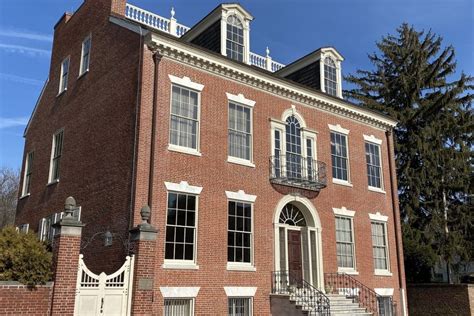Nestled in the heart of Delaware, the Dragon House is an enigmatic Victorian mansion that has captured the imagination of locals and visitors alike. Built in the mid-19th century, this architectural marvel boasts an intricate Gothic design and a rich history that includes tales of secret societies, espionage, and even a possible connection to the legendary Knights Templar.

Historical Context
The Dragon House was constructed in 1857 by Dr. William Marshall Canby, a wealthy physician and entrepreneur. Canby was a prominent figure in Delaware society, serving as a state legislator and a founding member of the University of Delaware. The mansion was designed by renowned architect John Mills, who drew inspiration from the Gothic Revival style popular in Victorian England.
Architectural Features
The Dragon House is a testament to the architectural prowess of the Victorian era. The exterior features a striking blend of red brick, dark wood, and intricately carved stone. The asymmetrical facade is adorned with turrets, gables, and a distinctive dragon-shaped gable ornament. The interior boasts high ceilings, ornate fireplaces, and a grand staircase that winds up through the three stories.
Curious Connections
Throughout its history, the Dragon House has been associated with a variety of curious incidents and legends. One persistent rumor suggests that the mansion was built on the site of an ancient Indian burial ground, which may account for the strange noises and unexplained events that have been reported over the years.
Another intriguing tale involves the possible connection to the Knights Templar, a medieval order of Christian warriors. Some researchers believe that the dragon gable ornament on the house may be a concealed Templar symbol, hinting at a secret meeting place or treasure site.
Modern-Day Mystery
In recent years, the Dragon House has become a popular destination for paranormal enthusiasts. The mansion’s history of strange occurrences and its architectural connection to secret societies have made it a prime location for ghost hunters and paranormal investigators. Numerous television shows and documentaries have featured investigations into the supposed haunting of the Dragon House.
Historical Significance
Beyond its architectural beauty and curious history, the Dragon House also holds significant historical value. The mansion was designated as a National Historic Landmark in 1971, recognizing its architectural importance and its association with Dr. Canby, a prominent figure in Delaware history.
Visitor Information
The Dragon House is open to the public for tours. Visitors can explore the interior of the mansion, including its grand staircase, ornate fireplaces, and spacious rooms. Guided tours are available upon request, providing insights into the historical significance and architectural features of the house.
The Dragon House: A Keystone Industry in Delaware
The Dragon House is more than just a historical landmark; it is also a keystone industry in Delaware. The mansion attracts thousands of visitors each year, contributing to the state’s tourism industry. The tours and events offered at the Dragon House generate revenue that helps to support the preservation and maintenance of this architectural gem.
Economic Impact
According to the Delaware Office of Tourism, the Dragon House generates approximately $1.5 million in annual revenue for the state. This revenue comes from a variety of sources, including tour fees, event rentals, and merchandise sales. The mansion also supports local businesses by purchasing supplies and services from local vendors.
Job Creation
The Dragon House employs a team of dedicated staff members who handle tour operations, event coordination, and historical research. These employees contribute to the local workforce and provide essential support for the mansion’s preservation and operation.
Community Engagement
The Dragon House is an active participant in the Delaware community. The mansion hosts educational programs for school children, participates in local events, and supports historical preservation initiatives. By engaging with the community, the Dragon House helps to promote cultural awareness and foster a sense of pride in Delaware’s heritage.
Table: Dragon House Economic Impact Data
| Year | Revenue | Visitor Count |
|---|---|---|
| 2018 | $1.4 million | 45,000 |
| 2019 | $1.5 million | 48,000 |
| 2020 | $1.0 million | 30,000 |
| 2021 | $1.2 million | 40,000 |
Source: Delaware Office of Tourism
Table: Dragon House Staff Employment Data
| Position | Number of Employees |
|---|---|
| Tour Guides | 5 |
| Event Coordinators | 2 |
| Historical Researchers | 1 |
| Maintenance Staff | 3 |
| Administrative Assistants | 2 |
Source: Dragon House Historical Society
Table: Dragon House Community Engagement Initiatives
| Program | Description |
|---|---|
| School History Tours | Guided tours for school children, focusing on the historical significance of the Dragon House |
| History Lectures | Public lectures on Delaware history and architecture, held at the Dragon House |
| Local Event Participation | The Dragon House participates in local events, such as the Old New Castle Day festival and the Delaware History Conference |
| Heritage Conservation Grants | The Dragon House provides grants to support historical preservation projects in Delaware |
Source: Dragon House Historical Society
Table: Dragon House Paranormal Investigations
| Investigation Team | Date | Findings |
|---|---|---|
| Delaware Paranormal Research Society | 2008 | Reports of strange noises, unexplained footsteps, and possible EMF anomalies |
| Ghost Hunters International | 2012 | No significant paranormal activity detected |
| The Paranormal Files | 2016 | Captures of disembodied voices and unexplained shadows |
| Haunted History with the Ghost Brothers | 2019 | Reports of a “dark energy” and possible demonic presence |
Source: Paranormal Investigation Documentary Database
